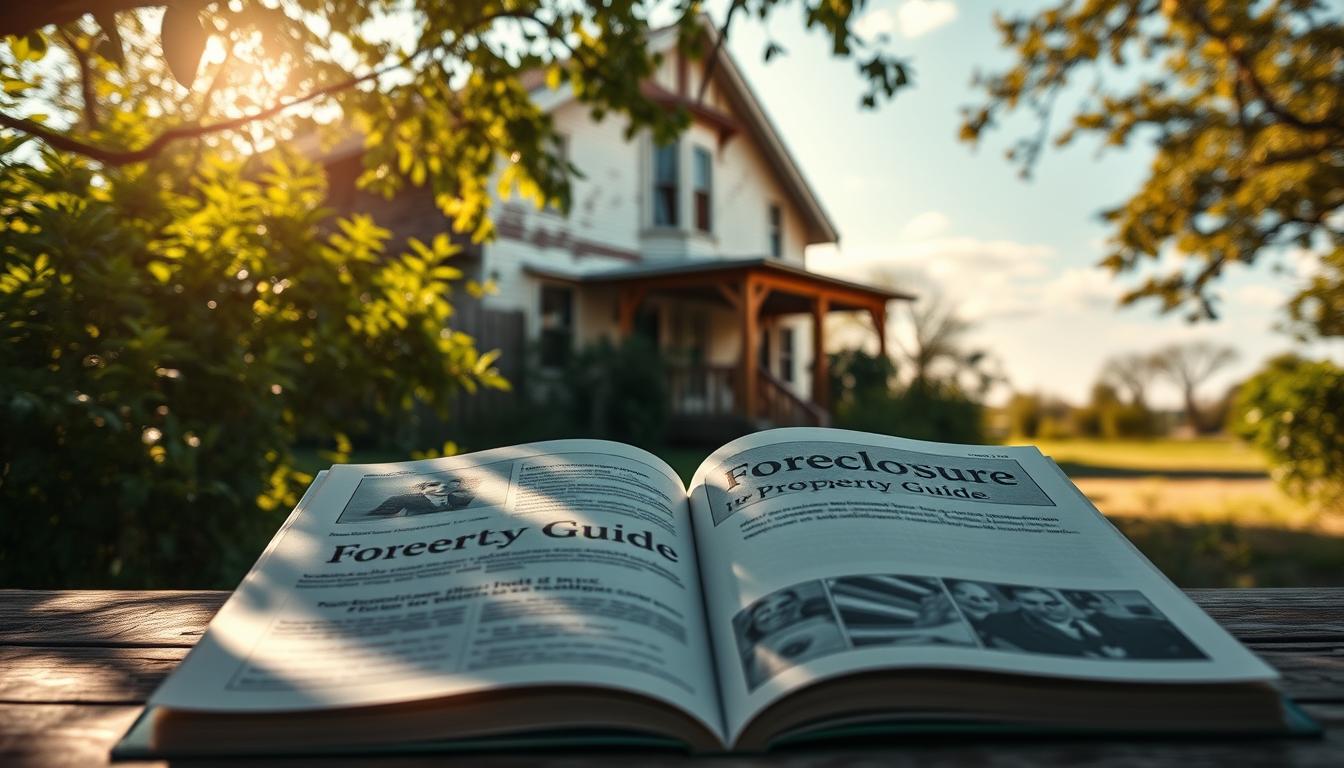Buying a foreclosed home in Canada needs smart planning and knowledge. New Homes Alberta knows it’s tough for investors and buyers looking for deals. They want to learn how to find affordable homes.
Foreclosure happens when owners can’t pay their mortgages. This lets lenders take back and sell the property. These homes can be great deals for those who know how to find them.
This guide will show you the world of foreclosed homes in Canada. We’ll give you key tips for making smart choices. You’ll learn about the market, financial needs, and how to invest in foreclosures.
Key Takeaways
- Foreclosed homes typically sell below market value
- Mortgage preapproval increases chances of securing properties
- Properties are often sold “as is” with possible repair costs
- Competitive offers are key in foreclosure auctions
- Professional real estate advice can lower investment risks
Understanding Foreclosure in the Canadian Market

Understanding foreclosure in Canada is key. It’s when lenders take back properties because of missed mortgage payments. This is a chance for buyers to find good deals on bank-owned properties.
What is a Foreclosure Property?
A foreclosure happens when someone can’t pay their mortgage, usually after 120 days. Lenders then start legal steps to get the property back. These homes often sell for less than their worth, which is good for investors and first-time buyers.
Types of Foreclosure Processes in Canada
Canada has two main ways to handle foreclosures:
- Power of Sale: This is quicker, with lenders selling the property without going to court.
- Judicial Foreclosure: This takes longer and involves court actions.
Current State of Foreclosures in Canada
Foreclosures are not common in Canada. Lenders usually try to solve problems without going to court. The strong real estate market and strict lending rules help keep foreclosure rates low.
| Foreclosure Aspect | Key Details |
|---|---|
| Default Threshold | 4 missed mortgage payments |
| Redemption Period | Approximately 35 days |
| Eviction Notice | 30 days after redemption period |
When looking at bank-owned properties, do your homework. Get help from experts to make the most of your investment in the distressed real estate market.
The Benefits of Purchasing Foreclosed Properties
REO properties are great for smart home buyers and investors. They offer a chance to find bargain homes in Canada. These deals can lead to big financial gains.
Foreclosed homes are priced lower than market value. They can be 10% to 25% cheaper. This makes them a good choice for those on a budget. The value of these homes can grow over time.
- Substantial Cost Savings: Buyers can get properties at lower prices
- Equity Building: Renovations can quickly raise the property’s value
- Investment Opportunities: Perfect for flipping houses or growing a rental portfolio
Investors and first-time buyers should know the benefits and challenges of REO properties. These sales are competitive. Buyers need to act fast and do thorough checks.
- Rapid decision-making
- Thorough property assessments
- Potential additional renovation costs
The Canadian foreclosure market has different opportunities in each province. In places like British Columbia and Quebec, the process is more complex. It may need judicial court permission, affecting the buying strategy.
Smart investors see foreclosed properties as more than just purchases. They are strategic financial opportunities.
It’s important to understand the risks and rewards of these properties. While they can save a lot of money, buyers need to do their homework. They should also be ready for any renovation costs.
How to Buy a Foreclosed Home: Step-by-Step Process
Buying foreclosed homes needs a smart plan. For those looking at investor properties or fixer-uppers, knowing the steps is key. This is important for success in Canada’s real estate market.
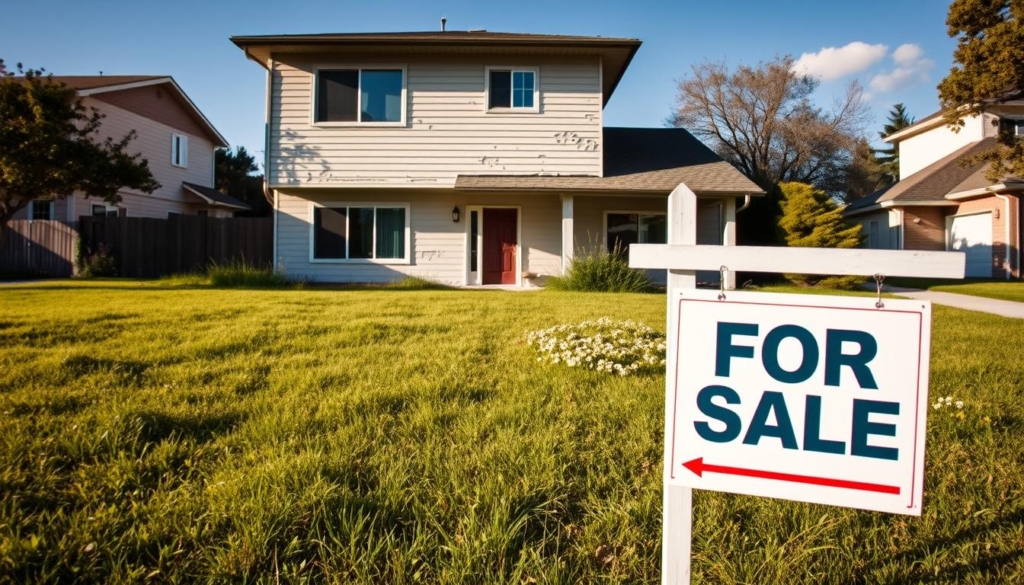
The process of buying a foreclosed home has many important stages. It requires careful planning and deep research. With the right information, investors can find great deals.
Finding Foreclosed Properties
Finding foreclosed homes involves different strategies:
- Work with real estate agents who know foreclosure markets
- Search online on foreclosure websites
- Go to local property auctions
- Contact banks and financial institutions
- Watch local court records for foreclosure sales
Evaluating Property Conditions
When looking at fixer-uppers, a detailed property check is vital. Foreclosed homes often need a lot of repairs and updates.
Important steps for evaluation are:
- Get a professional home inspection
- Guess the cost of renovations
- Look at the property’s history and maintenance records
- Figure out the investment return
Making Competitive Offers
Success in investor properties comes from smart offers. In Canada, foreclosures offer chances for smart buyers.
Good offer strategies are:
- Research similar property values
- Get pre-approved for a loan
- Know the local market
- Be ready for bidding wars
- Offer flexible terms that attract sellers
Remember, patience and thorough research are key when pursuing foreclosed properties in Canada.
Working with Real Estate Professionals
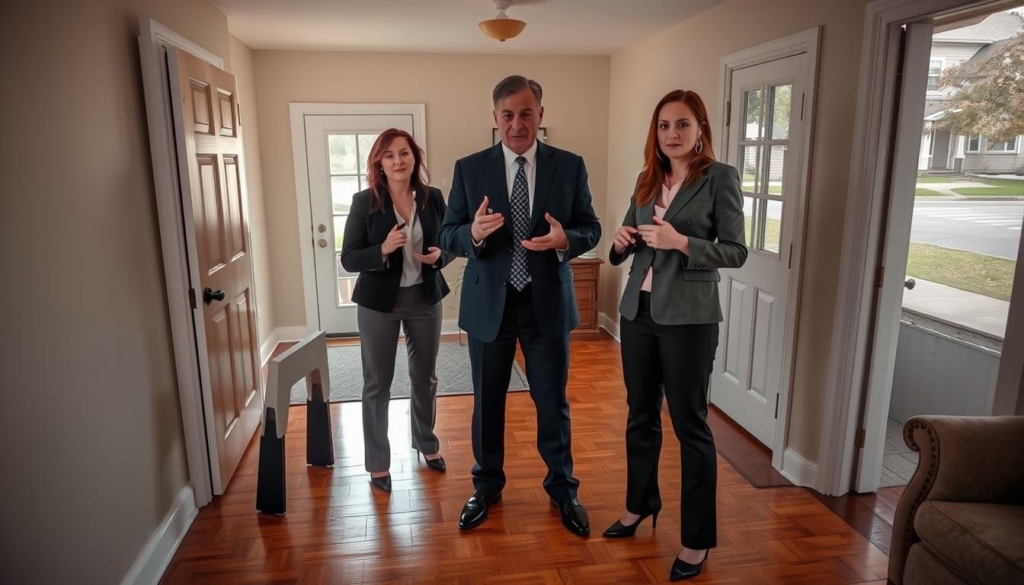
Buying a foreclosed home can be tricky. Real estate experts are key in helping you make a good purchase. They know how to avoid bad deals and find great properties.
When looking for a foreclosed home, find professionals who know this market well. Look for agents and brokers who focus on distressed properties. They understand the foreclosure process better than others.
- Seek agents with proven track record in foreclosure sales
- Verify their experience with local market conditions
- Request references from previous foreclosure property clients
The right real estate professional can help you:
- Identify good foreclosure opportunities
- Evaluate property conditions accurately
- Navigate complex legal requirements
- Negotiate effectively with lenders
Pro tip: Investors who work with experienced professionals are statistically more likely to find successful foreclosure deals. RE/MAX Affiliates, recognized among the top Canadian real estate professionals, can provide invaluable insights into how to buy a foreclosed home.
Need expert guidance? Contact New Homes Alberta at (403) 305-9167 for personalized assistance in your foreclosure property journey.
Financial Preparation and Mortgage Requirements
Buying foreclosed properties needs smart planning and preparation. Those looking at short sales and pre-foreclosure deals must know the financial details. These options come with their own set of financial challenges.

Having a solid financial base is key for buying foreclosed properties in Canada. The journey involves several important steps. These steps can greatly affect your success in buying.
Getting Pre-approved for a Mortgage
A pre-approval is like a pass to the foreclosure market. Lenders check your financial health by:
- Looking at your credit score
- Checking your income
- Examining your debt-to-income ratio
- Assessing your job stability
Understanding Down Payment Requirements
Down payments for foreclosed properties might be different from regular homes. Buyers should expect to pay a larger percentage. This is because foreclosures are seen as riskier.
| Property Type | Typical Down Payment | Additional Considerations |
|---|---|---|
| Foreclosed Residential | 20-25% | May require additional repair funds |
| Short Sale Property | 15-20% | Potential negotiation opportunities |
Budget Planning for Additional Costs
Foreclosed properties often have unexpected expenses. Smart investors should plan for:
- Renovation costs
- Property inspection fees
- Legal document costs
- Back taxes or liens
Smart financial planning can turn short sales and pre-foreclosure deals into good investments. With careful planning and expert advice, you can succeed in this unique real estate market.
Power of Sale vs. Judicial Foreclosure
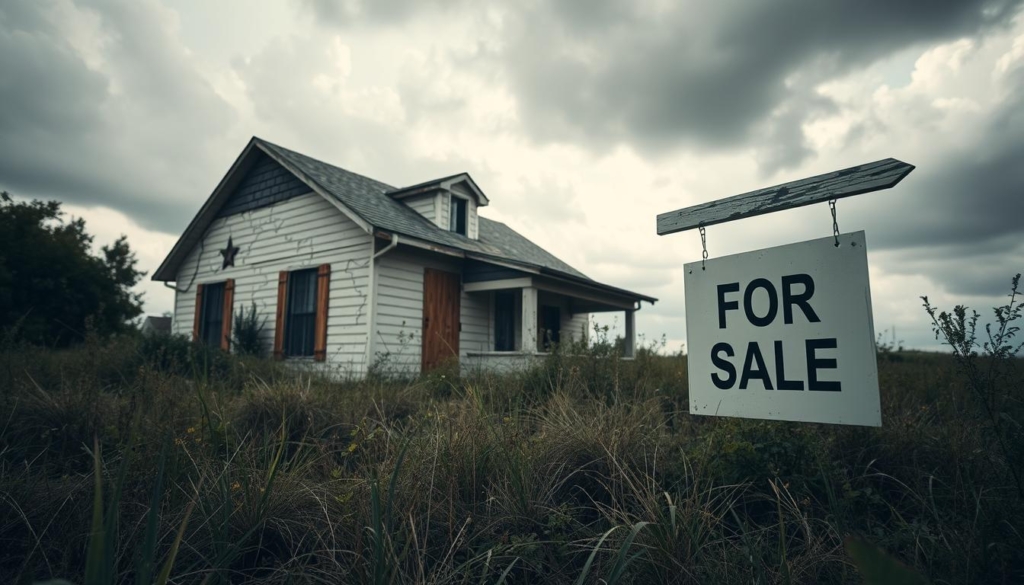
Understanding distressed real estate in Canada can be tricky. There are two main ways to handle mortgage defaults: power of sale and judicial foreclosure.
Power of sale is used in some provinces like Ontario and New Brunswick. It lets lenders sell REO properties quickly without needing court help.
- Typical power of sale timeline: Approximately 6 months
- Standard redemption period: 35 to 40 days
- Lenders must provide minimum 15-day default notice
Judicial foreclosure, on the other hand, involves a lot of court work. Lenders must file a Statement of Claim and get a court order to seize the property. This process takes longer and costs more.
| Process Characteristic | Power of Sale | Judicial Foreclosure |
|---|---|---|
| Average Completion Time | 6 months | Over 1 year |
| Court Involvement | Minimal | Extensive |
| Homeowner Equity Opportunity | Higher chance of retaining | Limited equity retention |
For those looking into REO properties, knowing these differences is key. The power of sale method is often quicker and easier for both lenders and buyers in the distressed real estate market.
Property Inspection and Due Diligence
Buying fixer-uppers needs careful checking. Foreclosed homes have special issues that need a close look before buying. Bargain homes can turn costly without the right checks and document reviews.
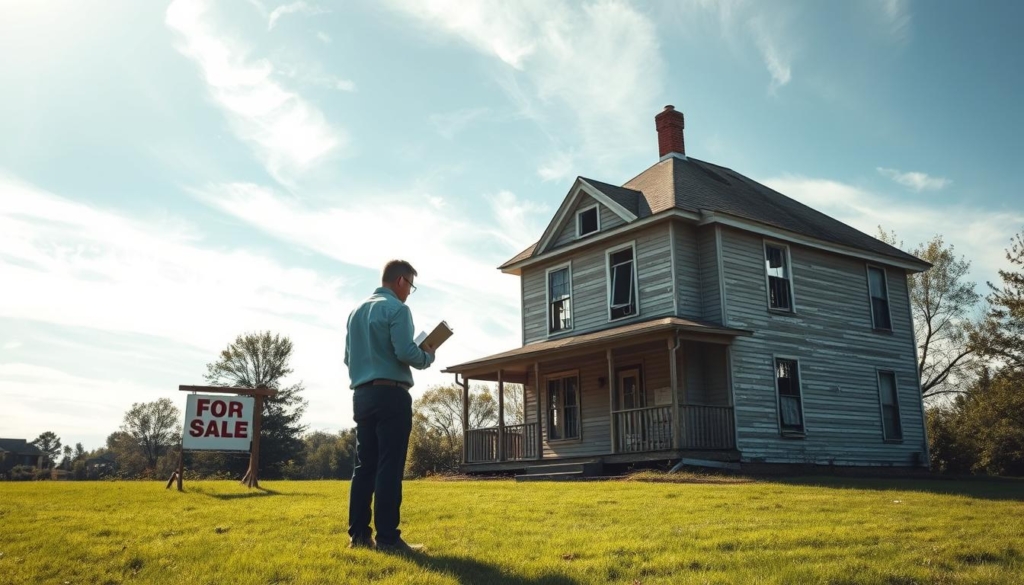
Investors and buyers must know that foreclosed homes are sold as-is. This means the buyer takes all risks and costs for repairs.
Home Inspection Checklist
- Structural integrity assessment
- Electrical system evaluation
- Plumbing system examination
- Roof and foundation inspection
- HVAC system condition check
Common Issues in Foreclosed Homes
Foreclosed properties often face big challenges:
- Potential vandalism damage
- Deferred maintenance problems
- Outdated electrical or plumbing systems
- Potential pest infestations
- Structural wear from prolonged vacancy
“A thorough inspection can save thousands in unexpected repair costs.” – Real Estate Professional
Documentation Review
Key documents for buying fixer-uppers include:
- Property title search
- Lien reports
- Outstanding tax records
- Previous ownership history
Doing deep research helps lower risks when buying bargain homes. Professional inspectors can give detailed info on needed repairs and costs.
Understanding the Bidding Process

Foreclosure auctions need careful planning and a deep understanding of the process. They offer a chance for smart investors and homebuyers to find properties at lower prices.
In Canada, foreclosure auctions come with their own set of challenges and chances. They are different from regular real estate deals because of their unique rules:
- Full payment is usually needed upfront
- It’s a competitive bidding scene
- You have fewer options for backing out
- Properties are sold “as is”
To succeed in foreclosure auctions, buyers must have a solid strategy. Research is key – knowing property values, setting a maximum bid, and staying calm during bidding are vital skills.
Important steps for a successful bid include:
- Get pre-approved for a loan
- Do thorough research on the property
- Plan for renovation costs
- Know the auction registration rules
- Have enough deposit money ready
While public auctions are common, there are other ways to buy foreclosed homes. For example, you can look at bank-owned listings on real estate websites. Big Canadian banks often list repossessed properties.
Pro Tip: Always do a professional home inspection and a title search before buying a foreclosed home.
Success in foreclosure auctions comes from patience, preparation, and smart choices. By understanding the process, buyers can turn challenges into great investment chances.
Legal Considerations and Requirements
Buying bank-owned properties requires careful attention and a deep understanding. Investor properties in the foreclosure market have unique legal challenges. These demand thorough investigation and strategic planning.
The legal framework for foreclosed homes in Canada is complex. It protects both buyers and lenders. Knowing these details helps investors make smart choices.
Title Search Essentials
A detailed title search is key when buying foreclosure properties. It reveals legal issues such as:
- Existing liens against the property
- Unresolved legal encumbrances
- Potential ownership disputes
- Outstanding municipal or tax obligations
Provincial Regulatory Landscape
Canadian provinces have their own rules for foreclosure sales. Alberta, for example, uses a judicial sale process. This requires court approval for fairness and market value.
Important legal points for investor properties include:
- Verifying complete property ownership transfer
- Understanding redemption periods
- Confirming absence of additional financial claims
- Assessing legal restrictions
Title Insurance Protection
Title insurance is vital for bank-owned properties. It protects buyers from legal issues. This gives financial security and peace of mind during the purchase.
Thorough legal due diligence is the cornerstone of successful foreclosure property investments.
Understanding these legal aspects helps investors confidently buy foreclosure properties. This approach reduces risks and increases returns in the Canadian real estate market.
Hidden Costs and Budget Planning

Buying homes in the foreclosure market needs careful money planning. Buyers must look beyond the first price to see the full cost of these investments.
Hidden costs can add up fast, making a cheap home expensive. These extra costs include:
- Extensive property repairs and renovations
- Utility reconnection fees
- Outstanding property tax obligations
- Administrative processing charges
- Legal documentation expenses
Investors and buyers should expect to spend a lot on foreclosed homes. The average cost of deferred maintenance repairs can range into thousands of dollars. This can eat into the savings from buying a distressed property.
Good budget planning means doing a full property check and saving extra money. Experts say to save 10-20% of the purchase price for repairs and renovations.
| Expense Category | Estimated Cost Range |
|---|---|
| Minor Repairs | $2,000 – $5,000 |
| Major Renovations | $10,000 – $25,000 |
| Utility Reconnections | $500 – $1,500 |
While bargain homes look good, they need careful money planning. Knowing the extra costs is key to a successful buy in the distressed real estate market.
Renovation and Repair Considerations
Buying fixer-uppers needs careful planning and smart investment. Investor properties in the foreclosure market need a detailed approach to assess renovation needs and costs.
Foreclosed homes often face unique challenges for buyers. The condition can vary a lot, from simple cosmetic updates to major structural repairs.
Assessing Renovation Needs
When looking at a foreclosed property, investors should do a detailed inspection. Focus on key areas:
- Structural integrity
- Electrical systems
- Plumbing infrastructure
- Roof and foundation condition
- Potential moisture or water damage
Cost Estimation Guidelines
Getting the cost right is key for investor properties. Here’s a guide to help estimate renovation costs:
| Renovation Type | Estimated Cost Range | Impact on Property Value |
|---|---|---|
| Cosmetic Updates | $5,000 – $15,000 | Moderate improvement |
| Major Structural Repairs | $20,000 – $50,000 | Significant value increase |
| Complete Renovation | $50,000 – $100,000 | Potential market value transformation |
Buying foreclosures in Alberta can save up to 20%. But, it’s important to think about repair costs. Successful investor properties need careful planning and realistic budgets.
Pro Tip: Always include a 10-15% contingency budget for unexpected repair costs when buying fixer-uppers.
Avoiding Common Pitfalls
Buying a foreclosed home needs a smart plan and knowing the risks. Investors and buyers face unique challenges that differ from regular home purchases.
Buying a foreclosed property can be tricky. Knowing the risks helps buyers make smart choices and protect their money.
- Underestimate repair costs that can significantly exceed initial expectations
- Overlook complex legal issues embedded in property ownership
- Skip thorough property inspections
- Fail to budget for unexpected renovation expenses
- Ignore possible liens or outstanding tax obligations
Foreclosed homes often have hidden problems. Up to 60% need big repairs, from structural issues to electrical failures. Buyers might find that fixing these costs eats into their savings.
Getting help from experts is key when looking at distressed properties. Agents who know foreclosures can guide buyers through legal issues, check the property well, and spot problems early.
Smart buyers approach foreclosed properties with caution, thorough research, and realistic financial planning.
To avoid risks, buyers should get detailed property checks, study local markets, know foreclosure laws, and have a flexible budget for surprises.
Negotiation Strategies for Foreclosed Properties

Negotiating bank-owned properties needs a special strategy. It’s different from regular real estate deals. REO properties offer great chances for smart buyers who put in the effort to learn about them.
Winning in foreclosed home negotiations involves a few key steps:
- Research comparable sales in the neighborhood
- Understand the lender’s motivation to sell quickly
- Prepare a detailed property condition report
- Have competitive financing options ready
It’s important to know that bank-owned properties can be priced more flexibly. Lenders want to get rid of these assets fast. This gives buyers a chance to negotiate better.
Here are some top negotiation tips for REO properties:
- Do a thorough property inspection
- Find out about any repair costs
- Make an offer based on the property’s value and repairs needed
- Be ready to talk about repair credits or lower prices
Cash offers are usually the strongest in foreclosed property negotiations. Buyers with pre-approved loans and a good understanding of the property’s state can make strong offers. These attract the lender’s attention.
Successful foreclosure negotiations require patience, research, and a strategic mindset.
Every bank-owned property is different. Being flexible and getting professional advice can really help you get a great deal in the foreclosure market.
Conclusion
Learning how to buy a foreclosed home needs careful planning and a deep understanding. The Canadian real estate market has special chances for those who look into foreclosure auctions. Buyers, whether new or experienced, can save a lot by knowing how to buy foreclosed properties.
To buy a foreclosed property well, you need to do your homework, get your finances in order, and seek expert advice. You must check the property’s condition, know the laws in your province, and plan for any repairs. Remember, while foreclosed homes might be cheaper, they also come with risks that need careful thought.
New Homes Alberta suggests working with real estate experts who know the foreclosure market. Our team offers personalized help to guide you in your property investment. For tailored advice, call our specialists at (403) 305-9167.
With the right knowledge and planning, you can turn challenges into great real estate chances. Always be ready, financially and with the right support, to tackle the complex world of foreclosed property buying in Canada.


